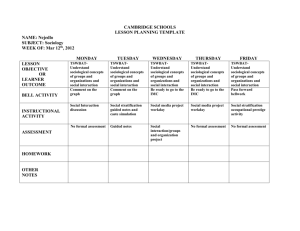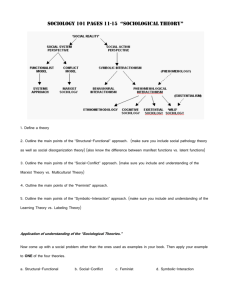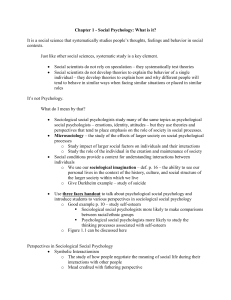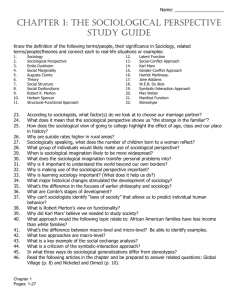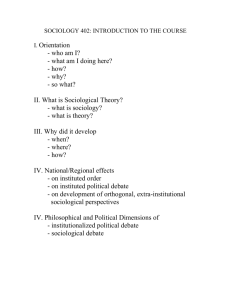Structural Aspects of Social Interaction
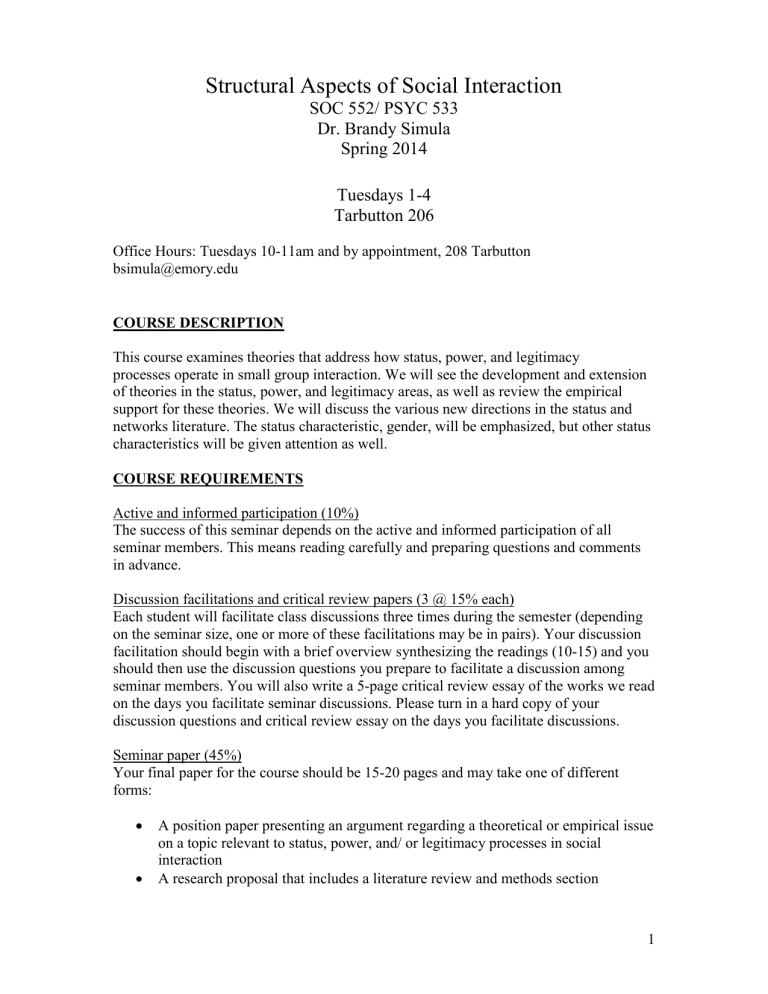
Structural Aspects of Social Interaction
SOC 552/ PSYC 533
Dr. Brandy Simula
Spring 2014
Tuesdays 1-4
Tarbutton 206
Office Hours: Tuesdays 10-11am and by appointment, 208 Tarbutton bsimula@emory.edu
COURSE DESCRIPTION
This course examines theories that address how status, power, and legitimacy processes operate in small group interaction. We will see the development and extension of theories in the status, power, and legitimacy areas, as well as review the empirical support for these theories. We will discuss the various new directions in the status and networks literature. The status characteristic, gender, will be emphasized, but other status characteristics will be given attention as well.
COURSE REQUIREMENTS
Active and informed participation (10%)
The success of this seminar depends on the active and informed participation of all seminar members. This means reading carefully and preparing questions and comments in advance.
Discussion facilitations and critical review papers (3 @ 15% each)
Each student will facilitate class discussions three times during the semester (depending on the seminar size, one or more of these facilitations may be in pairs). Your discussion facilitation should begin with a brief overview synthesizing the readings (10-15) and you should then use the discussion questions you prepare to facilitate a discussion among seminar members. You will also write a 5-page critical review essay of the works we read on the days you facilitate seminar discussions. Please turn in a hard copy of your discussion questions and critical review essay on the days you facilitate discussions.
Seminar paper (45%)
Your final paper for the course should be 15-20 pages and may take one of different forms:
A position paper presenting an argument regarding a theoretical or empirical issue on a topic relevant to status, power, and/ or legitimacy processes in social interaction
A research proposal that includes a literature review and methods section
1
An analytical synthesis of topics stemming from the two different parts of the course
A substantially revised version of a previous paper that draws on topics course in the course
COURSE SCHEDULE
Jan 14 Introduction to Course
PART 1: STATUS
Jan 21 Classical Studies of Emergence and Operation of Status
Orders and Overview and Basic Assumptions of the Expectation States Theory of Status Processes
Bales, Robert. 1965. "The Equilibrium Problem in Small Groups." Pp. 444-476 in
Small Groups: Studies in Social Interaction, edited by Hare, Borgatta, and Bales,
2ndedition. New York: Alfred A. Knopf, Inc.
Strodtbeck, F.L., R. M. James and C. Hawkins. 1957. Social status in jury deliberations.
American Sociological Review 22:713-19.
Whyte, William F. 1943. Street Corner Society, pp. 2-25. Chicago: University of Chicago
Press.
Berger, J. and T.L. Conner. 1974. Performance expectations and behavior in small groups: a revised formulation. Pp. 85-109 in Expectation States Theory: A
Theoretical Program , edited by Berger,J. T.L. Connor, and M.H. Fisek.
Cambridge MA: Winthrop.
Berger, J., S. Rosenholtz, and M. Zelditch, Jr. 1980. Status organizing processes.
Annual Review of Sociology 6:479-508.
Jan 28 Gender Status and Interaction
Wood, W. and S.J. Karten. 1986. Sex differences in interaction styles as a product of perceived sex differences in competence. Journal of Personality and Social
Psychology 50:341-7.
Ridgeway,C., J. Berger, and L. Smith. 1985. Nonverbal cues and status: an expectation states account. American Journal of Sociology 90:955-78.
Ridgeway, C. 1987. Nonverbal behavior, dominance, and the basis of status in task groups. American Sociological Review 52:683-94.
Carli, Linda. 1995. “Nonverbal behavior, gender, and influence.”
Journal of
Personality and Social Psychology 68:1030-1041.
Ridgeway, C. and L. Smith-Lovin. 1999. The gender system and interaction. Annual
Review of Sociology 25:191-216
Feb 4 Status and Legitimacy
Meeker, B. and Weitzel O'Neill. 1977. Sex roles and interpersonal behavior. American
Sociological Review 42:92-105.
Ridgeway, C. and J. Berger. 1986. Expectations, legitimation and dominance in task
2
groups. American Sociological Review 51:603-17.
Ridgeway,C., C. Johnson, D. Diekema. 1994. External status, legitimacy, and compliance in male and female groups. Social Forces 72:1051-1077.
Hysom, Stuart. 2009. “Status Valued Goal Objects and Performance Expectations.”
Social Forces 87:1623-1648.
Berger, Joseph, Cecilia L. Ridgeway, M. Hamit Fisek, and Robert Z. Norman. 1998.
“The Legitimation and Delegitimation of Power and Prestige Orders.”
American
Sociological Review 63:379-405.
For review:
Correll, Shelley J. And Cecilia L. Ridgeway. 2003. Expectation States Theory.
Pp.29-52 in Handbook of Social Psychology, edited by John Delamater.
New York: KluwerAcademic/Plenum Publishers.
Zelditch, Morris Jr. 2006. Legitimacy Theory. Pp. 324-352 in Contemporary
Social Psychological Theories, edited by Peter J. Burke. Stanford:
Stanford University Press.
Feb 11 Class cancelled
Feb 18 Status Processes and Organizations
Owen-Smith, Jason. 2001. Managing Scientific Laboratory Work Through
Skepticism. American Sociological Review 66:427-452.
Correll, Shelley J. 2004. Gender, Status and Emerging Career Aspirations.
American Sociological Review 69:93-113.
Roscigno, Vincent J., Steven H. Lopez, and Randy Hodson. 2009. “Supervisory
Bullying, Status Inequalities and Organizational Context.”
Social Forces 87:1561-
1588.
Ridgeway, Cecilia. 1997. “Interaction and the Conservation of Gender Inequality.”
American Sociological Review 62:218-235.
Feb 25 Status/ Legitimacy Processes in Organizations- Gender
Lucas, Jeffrey N. 2003. Status Processes and the Institutionalization of Women as
Leaders. American Sociological Review 68:464-480.
Mueller, Charles W., Munyae Mulinge, and Jennifer Glass. 2002. “Interactional
Processes and Gender Workplace Inequalities.”
Social Psychology Quarterly
65:163-185.
Johnson, C., A.M. Fasula, S.J. Hysom, and N. Khanna. 2006. “Legitimacy,
Organizational Sex Composition, and Female Leadership.” Advances in Group
Processes 23:117-147.
Mar 4 Origins of Status Characteristics
Ridgeway. C. L. 1991. The social construction of status value: gender and other nominal characteristics. Social Forces 70:367-386.
Ridgeway, C. L. and K. G. Erickson. 2000. Creating and spreading status beliefs.
American Journal of Sociology 106:579-615.
Ridgeway, C. L., K. Bachor, Y.E. Li, J E. Tinkler, and K. G. Erickson. “How Easily
Does a Social Difference Become a Status Distinction?” 2009.
American
Sociological
3
Review. 74:44-62.
Ridgeway, C. 2006. Status Construction Theory. Pp. 301-323 in Contemporary Social
Psychological Theories, edited by Peter J. Burke. Stanford: Stanford University
Press.
Ridgeway, C. and D. Diekema. 1992. “Are gender differences status differences?” Pp.
157-180 in Gender, Interaction, and Inequality,
Springer-Verlag.
Mar 11 Spring Break/ No Class edited by Ridgeway. New York:
Mar 18 Status, Legitimacy, Race, and Ethnicity
Brezina, Timothy and Kenisha Winder. 2003. Economic Disadvantage: Status
Generalization, and Negative Racial Stereotyping by White Americans. Social
Psychology Quarterly 66:402-418.
Hochschild, Jennifer L. and Vesla Weaver. 2007. “The Skin Color Paradox and the
American Racial Order.”
Social Forces 86:643-670.
Frannk, Reanne, Ilana Redstone Akresh, and Bo Lu. 2010. “Latino immigrants and the
U.S. Racial Order: How and Where do They Fit In?” American Sociological
Review
378-401.
PART II: POWER AND LEGITIMACY
Mar 25 Conceptions and Theories of Power and Legitimacy
French, J. and Raven. 1959. The basis of social power. Pp. 150-67 in Studies in Social
Power , edited by Cartwright. Ann arbor, MI: University of Michigan Press.
Emerson, R. 1962. Power-dependence relations. American Sociological Review 27:31-40.
Zelditch, M. and H. Walker. 1984. Legitimacy and the stability of authority. Advances in
Group Processes 1:1-25.
Kanter, R.M. 1977. Power. Pp. 164-205 in Men and Women in the Corporation . New
York: Basic Books.
* Paper Proposals Due
Apr 1 Social Exchange Networks
Johnson, Cathryn, Rebecca Ford, and Joanne Kaufman. 2000. “Emotional reactions to conflict: Do dependence and legitimacy matter?”
Social Forces 79:107-137.
Emerson, R. 1972. Exchange theory, Part II: Exchange relations and networks. Pp. 58-87 in Sociological Theories in Progress , Vol. 2, edited by Berger, Zelditch and
Anderson. Boston: Houghton-Mifflin.
Cook, K. and R. Emerson. 1978. Power, equity and commitment of reward and punishment power. Social Psychology Quarterly 51:108-122.
Kollock, P. 1994. The emergence of exchange structures: an experimental study of uncertainty, commitment, and trust. American Journal of Sociology 100:315-45.
Kuwabara, Ko, Robb Willer, Michael W. Macy, Rie Mashima, ShigeruTterai, and Toshio
Yamagishi. 2007. “ Culture, Identity, and Structure in Social Exchange: A Webbased Trust Experiment in the United States and Japan.” Social Psychology
Quarterly 461-479.
4
For review:
Cook, Karen S. And Eric Rice. 2003. Social Exchange Theory. Pp. 53-76 in
Handbook of Social Psychology, edited by John Delamater. New York:
KluwerAcademic/Plenum Publishers.. (For Review)
Apr 8 Exchange Network Extensions
Lawler, Edward J. 2001. An affect theory of social exchange. American Journal of
Sociology 107:321-352.
Lawler, Edward J., Shane R. Thye, and Jeongkoo Yoon. 2008. “Social Exchange and
Micro Social Order.”
American Sociological Review 73:519-542.
Molm, L., N. Takahashi, and G. Peterson. 2000. Risk and trust in social exchange: An experimental test of a classical proposition. American Journal of Sociology
105:1396-1427.
Molm, L., J. Collett, and D. Schaefer. 2007. Building solidarity through generalized exchange: A Theory of Reciprocity. American Journal of Sociology 113:205-242 .
Molm, Linda M. 2006. The Social Exchange Network. Pp. 24-45 in Contemporary
Social Psychological Theories, edited by Peter J. Burke. Stanford: Stanford
University Press.
Apr 15 Status, Power, and Legitimacy
Thye, Shane R. 2000. “A status value theory of power in exchange relations.” American
Sociological Review 65:407-432.
Thye, Shane R., David Willer, and Barry Markovskky. 2006. “From Status to Power:
New Models at the Intersection of Two Theories.” Social Forces 84:1471-1495.
Johnson, C., T .J. Dowd, and C.L. Ridgeway. “Legitimacy as a Social Process.”
Annual
Review of Sociology 32:53-78.
Johnson, C. 1994. Gender, legitimate authority, and leader-subordinate conversations.
American Sociological Review 59:122-35.
Piven, Frances Fox. 2007. Can power from below change the world? 2007 ASA
Presidential Address. American Sociological Review 73:1-14.
Apr 22 Final paper presentations
Hard copy of final paper due in my mailbox by 5pm on April 30 th
.
5


